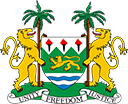Procurement and Transport
- You are here: Home
- Procurement and Transport
1. ESTABLISHMENT OF THE DEPARTMENT (OUR HISTORY)
Public procurement in Sierra Leone is subject to the Public Procurement Act 2016 (Gazette Vol. CXLVII, No.10). Legislation can only provide the overall rules to be followed, and with the increasing value and complexity of procurement, effective guidelines and step-by-step procedures are required to assist civil servants, all public officials and other individuals involved or interested in the procurement process. Sound public procurement practices and policies are essential aspects of sound governance. Good procurement practices can reduce costs and produce timely service delivery. Poor procurement practices generally lead to delays and waste and are often the cause of government inefficiencies and allegations of corruption. Consistent application of the guidelines presented in this Manual will substantially improve public service delivery efficiency whilst reducing the perception and actual occurrence of corruption in public procurement in Sierra Leone
2. WHO WE ARE & WHY DO WE EXIST?
The Department of Procurement and Transport is the overall process of acquiring goods, works and services including all functions from the identification of needs, selection and solicitation of sources, preparation and award of contract, and all phases of the contract administration or the useful life of an asset and the management of official vehicles and motorbikes. Ensuring that Government vehicles, during use for delivering public services, are managed effectively and efficiently.
3. MANDATE
4. CORE VALUES
Respect for one another
Timely delivery
Punctuality
Result oriented
5. GUILDING PRINCIPLES
Public procurement principles are the foundation of public procurement and should be addressed in the public procurement rules. They govern the management of public procurement, and also set the framework for a code of conduct for public procurement practitioners and all other officials directly or indirectly associated with the public procurement process.
TRANSPARENCY
Transparency in public procurement is important. Information on the public procurement process must be made available to all public procurement stakeholders: contractors, suppliers, service providers, and the public at large, unless there are valid and legal reasons for keeping certain information confidential. Examples of confidential information are: proprietary information belonging to companies or individuals participating in the solicitation process, and certain military and defense-related procurements, to mention a few.
INTEGRITY OF THE PUBLIC PROCUREMENT AND TRANSPORT PROCESS
Integrity is essentially reliability. Bidders, and all other stakeholders, must be able to rely on any information disseminated by the procuring entity, formally or informally. The integrity of the procurement process assures confidence in the public procurement system. When solicitation documents are made publicly available, the information they contain must be dependable and free of ambiguities or bias.
ECONOMY
Synonymous with efficiency, value for money, and commercially reasonable price, the principle of economy emphasizes the need to manage public funds with care and due diligence so that prices paid for goods, services and works are acceptable and represent good value for the public funds expended on them.
Everyone associated with the public procurement process or directly responsible for facilitating the acquisition of goods and services with public funds, should strive to avoid fraud, waste and abuse of public resources; whether it is the result of over specifications of required goods, paying unreasonably high prices for substandard goods, collusion with other bidders, or other forms of unacceptable practices.
OPENNESS
Public procurement requirements should be open to all qualified organizations and individuals. The public should also have access to information pertaining to public procurement requirements. Access to public procurement information is not absolute. Confidential and proprietary information belonging to organizations and individuals participating in process should not be available publicly, and the extent of their disclosure should be detailed in the procurement rules or other relevant regulation.
FAIRNESS
Decision–making and actions must be unbiased, and no preferential treatment should be extended to individuals or organizations given that public procurement activities are undertaken with public funds.
All offers must be considered on the basis of their compliance with the stipulations of the solicitation documents, and offers should not be rejected for reasons other than those specifically stated in the solicitation documents and the procurement rules.
A contract should only be signed with the supplier, contractor or service provider whose offer is compliant and best responds to the objectives of the requirement in terms of technical capability and price. Suppliers, contractors or service providers should have the right to challenge the procurement process whenever they feel they were unfairly treated or that the procuring entity failed to carry out the procurement process in accordance with the public procurement rules. Such challenges must be based on the solicitation documents and/or the public procurement rules.
COMPETITION
The public procurement process should not be manipulated for the benefit of any organization or individual. Given that public procurement is funded primarily with tax payers’ money, all eligible organizations and individuals should be allowed to participate by submitting offers in response to a specific requirement for which they are qualified. Public procurement requirements should be widely disseminated to increase the chances of a good market response, leading to the award of competitively-priced contracts.
COLLABORATION
We value the contributions of others in our work and therefore listen and learn from them. We look forward for the contributions of other teams and departments in our work while we remain happy to share our expertise at all times.
6. OUR SERVICES?
We primarily serve Members of Parliament (MPs) and Staff of Parliament. We do also provide targeted services for:
We primarily serve Members of Parliament (MPs) and Staff of Parliament. We do also provide targeted services for:.
National Public Procurement Authority (NPPA)
Sierra Leone Road Safety Authority (SLRSA
Ministry of Transport and Aviation
6. DEPARTMENTAL ORGANOGRAM
DEPARTMENT OF PROCUREMENT AND TRANSPORT
STRUCTURE/ORGANOGRAM
subscribe to ourNEWSLETTER
Sign up for newsletter to get the latest news, announcements and event information.

